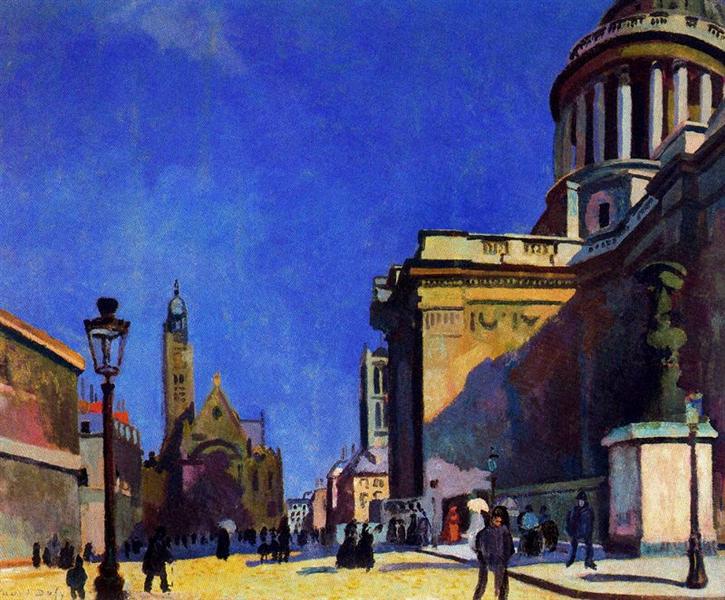Description
The painting "The Pantheon and St. Etienne-Du-Mont" by Raoul Dufy, made in 1904, is an emblematic work that encapsulates the vibrant essence of the Fauvista style and reflects the particular vision of the artist on the architecture and urban life of Paris . The work, which presents a view of two of the most representative monuments of the French capital, the pantheon and the Church of St. Etienne-Du-Mont, is characterized by its daring use of color and its focus on light, central elements in the evolution of modern art.
From a compositional point of view, Dufy organizes the space so that the buildings rise majestically, attracting the viewer's gaze to the sky. The pantheon, with its imposing dome, is associated with history and memory, while St. Etienne-du-Mont, with its Gothic architecture, evokes a sense of tradition and continuity. The disposition of the ways in painting creates a dialogue between both elements, in a balance that invites the contemplation of Parisian life and the interaction of its architecture with the environment.
The use of color is particularly notable in this work. Dufy, known for his vibrant palette, applies a series of nuances that go from deep blue to bright yellow, through green and roses in a dynamic game that emphasizes the luminosity of the day. The combination of these colors not only offers an attractive visual representation, but also suggests an emotion that resonates with the city's atmosphere. Light plays a crucial role, creating shadows that give volume to structures and provide a sense of movement to the composition.
As for the human figure, the work seems to dispense with well -defined characters, although it is possible to discern the silhouettes of people in the square that adds a certain vivacity to the scene. This almost abstract approach in representation humanizes space, suggesting a throbbing life that surrounds the monuments, while Dufy focuses more on the interaction between architecture and the natural environment than in the narration of individual stories.
It should be noted that "the Pantheon and St. Etienne-Du-Mont" is an example of the Fauvista style in which Dufy is framed, characterized by the exaltation of color and simplification of shapes. His work in this period is distinguished by expressive freedom and the search for new ways to represent reality. Other artists of the movement, such as Henri Matisse and André Derain, share this bold coloration exploration, although Dufy adds to their uniqueness an almost lyrical connection with urban landscapes.
Although much is not known about the specific context of this work in Dufy's career, there is no doubt that its innovative approach towards architectural representation and Parisian life as a whole opened paths for the exploration of urban space in modern painting. "The Pantheon and St. Etienne-Du-Mont" is, in this sense, not only a beautiful visual representation, but also a testimony of an era in which art began to free itself from the conventions of realism to celebrate the subjective experience through color and shape. The work stands as a milestone in Dufy's career, consolidating its place in the history of modern art and its love for light and color.
KUADROS ©, a famous paint on your wall.
Hand-made oil painting reproductions, with the quality of professional artists and the distinctive seal of KUADROS ©.
Art reproduction service with satisfaction guarantee. If you are not completely satisfied with the replica of your painting, we refund your money 100%.

